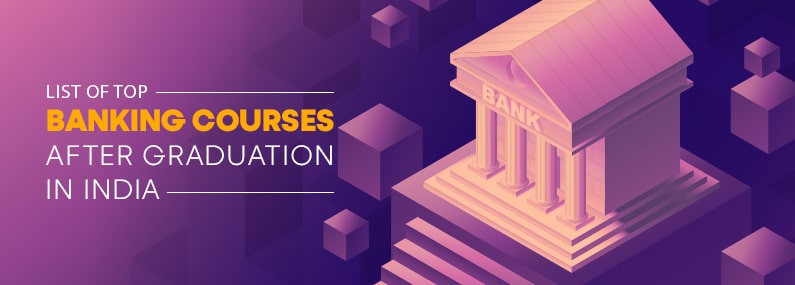The financial services industry is the backbone of any country’s economy. Banking is integral to this ecosystem, facilitating financial transactions and lending capital to fuel economic growth.
The banking sector has witnessed exponential growth in India over the past decade, creating a massive demand for trained banking professionals across public, private, and foreign banks.
Pursuing specialised banking courses after graduation can help you capitalise on this demand and build a rewarding career.
Why Choose a Career in Banking?

A career in banking offers more than just financial stability—it’s a chance to be part of an industry that fuels economic growth and innovates financial services. Here’s why banking is an excellent career choice:






Banking Courses After Graduation in India
Many academic institutions and banks in India offer specialised banking programs and certifications in banking courses after graduation to equip graduates with the skills needed in this sector. Below, you can find the list of banking courses:

Short-Term Banking Courses After Graduation (3 Months – 1 Year)
If you want quick industry entry, consider these short-term banking courses after graduation:
Certificate in Banking and Financial Services – Covers banking regulations, credit management, trade finance, and foreign exchange. Offered by ICICI, HDFC, and Yes Bank.
Postgraduate Diploma in Banking and Finance (PGDBF) – A 1-year diploma that focuses on financial markets, credit analysis, and risk management.
Certification in Trade Finance – Ideal for export-import finance roles, offered by banks like HSBC, ICICI, and Yes Bank.
Financial Risk Management (FRM) – Best for careers in risk assessment and credit analysis.
Bank PO & Clerical Exam Preparation – Secure a government bank job through SBI, IBPS, and RBI exams.
Long-Term Banking Courses After Graduation (1 – 2 Years)
For in-depth knowledge and higher managerial roles, opt for these long-term banking courses after graduation:
MBA in Banking and Finance – A 2-year program from IIMs, NMIMS, and SIBM that trains students in corporate finance, investment banking, and financial analytics.
Chartered Accountancy (CA) – Best for careers in corporate banking, auditing, and taxation.
Certified Financial Planner (CFP) – Specializes in investment management, taxation, and wealth advisory.

Best Banking Courses After B.Com & BBA
If you’ve completed B.Com or BBA, banking courses can further boost your career. Here are the top choices:




Top Institutes Offering Banking Courses in India
| Institute | Banking Program Offered |
|---|---|
| IIM Ahmedabad, Bangalore | Post Graduate Program (PGP) in Management |
| XLRI Jamshedpur | PG Diploma in Management (Banking & Finance) |
| NMIMS Mumbai | MBA in Banking |
| SIBM Pune | MBA in Banking and Finance |
| ICFAI Business School (IBS), Mumbai | PG Diploma in Banking & Finance |
Job Opportunities in the Banking Sector
Banking offers diverse career options. Here are some high-demand roles:

Roles: Teller, Relationship Manager, Customer Service Officer.

Roles: Credit Analyst, Corporate Relationship Manager, Branch Manager.

Roles: Investment Analyst, Equity Research Associate.

Roles: Credit Risk Analyst, Market Risk Specialist.
Salary Expectations in the Banking Sector

Here’s an overview of starting salary packages for banking professionals in India:
| Position | Average Salary |
|---|---|
| Bank PO (Probationary Officer) | ₹28,000 – ₹42,000 per month |
| Deputy Manager | ₹40,000 – ₹60,000 per month |
| Assistant Manager | ₹6 – 10 LPA |
| Chief Manager | ₹12 – 18 LPA |
| Chartered Accountant (CA) in Banking | ₹6 – 12 LPA |
How to Get Started?
Ready to launch your banking career? Here’s what you should do next:



Conclusion
Pursuing a banking course after graduation can be a game-changer for your career. With the booming Indian banking sector’s acute talent crunch, trained graduates have many opportunities.
Specialised academic programs and professional certifications equip you with industry-relevant skills in banking operations, credit management, financial advisory and the latest FinTech innovations. This unlocks lucrative and stable job roles in India’s public, private and foreign banks.
FAQs about Banking Courses After Graduation
Q1. What Are the Eligibility Criteria for Banking Courses After Graduation in India?
- For banking courses after graduation, graduates from any discipline can apply.
- A bachelor’s degree with 50% marks is required for postgraduate diploma and MBA programs. Entrance exams like CAT/MAT/XAT/CMAT scores may be considered.
Q2. How Long Do Banking Courses Take To Complete in India?
- Certificate courses can be completed in 3-12 months.
- Postgraduate diplomas take 1-2 years.
- MBA in Banking is a two-year full-time program.
- Chartered accountancy involves three levels and takes 3-4 years.
Q3. What Is the Scope of Banking Careers for Engineers?
Engineers can pursue short-term certificate programs, leading banks to transition into banking roles. They are well-suited for quantitative functions like credit analysis, risk management and treasury operations.
Q4. Which Banking Institute Is the Best for an MBA in Banking and Finance?
The IIMs and top-tier business schools like XLRI, MDI Gurgaon and SIBM Pune have the most prestigious MBA programs for banking and finance careers. Their robust curriculum, eminent faculty and extensive industry linkages provide a strong foundation.
Related Articles :




